If you’re thinking about developing a mobile app, the big question on your mind is likely, “How much does it cost?”
Well, the mobile app development cost can range anywhere from $20,000 to $300,000, depending on what you need.
A basic app with limited features will sit on the lower end of the spectrum, while a highly customized, complex app can go well beyond six figures.
But why does the price vary so much?
It all comes down to factors like design, functionality, development team, and location.
Whether you’re planning a user-friendly eCommerce app or a powerful enterprise solution, understanding the costs upfront can save you from surprises later.
Ready to learn if building an app is worth it for you? Let’s take a look at why 2025 is a great year to start your mobile app journey.
Should You Build a Mobile App in 2025?
Before we talk about mobile app development cost, let’s talk about whether or not you should create this app.
Is 2025 the right time to invest in a mobile app? Absolutely. Let’s break it down with three solid reasons why building an app now is a smart move.
► The Mobile Market is Thriving
By 2025, mobile apps are projected to generate $935 billion in revenue globally. That’s a staggering figure, reflecting how essential apps have become in people’s daily lives.
Whether it’s shopping, fitness, or banking, users are relying on apps more than ever.
► It’s All About Convenience
Consumers expect instant access to products and services. A mobile app allows you to meet this demand, offering seamless interaction and faster solutions.
Plus, it’s a powerful way to stay connected with your audience; right in their hands.
► Stay Ahead of Competitors
Let’s face it: if your competitors have an app and you don’t, you’re missing out. A mobile app not only enhances customer experience but also boosts brand loyalty.
It’s like having a direct channel to your audience that your competition can’t interrupt.
So, why wait? If you’ve been on the fence, 2025 is your year to make the leap.
Average Cost to Develop a Mobile App in 2025
So, how much does it cost to make an app
The cost to make a mobile app depends on multiple factors, including its complexity, features, and the development team's expertise.
While some apps can be built for as low as $20,000, others can easily cross the $150,000 mark, especially if they include advanced functionalities or integrations.
Here’s a detailed breakdown to help you get a clearer picture:
|
App Type |
Cost Range |
Examples |
Development Timeline |
|
Simple Apps |
$20,000 - $50,000 |
Calculator, To-Do List |
3-6 months |
|
Moderately Complex |
$50,000 - $150,000 |
Fitness Apps, E-Commerce Platforms |
6-9 months |
|
Highly Complex |
$150,000 and above |
Uber, Instagram, Enterprise Solutions |
9-12 months or more |
As you can see, the cost of mobile app development increases with added complexity.
Simple apps require fewer resources and time, while highly complex apps demand extensive design, development, and testing.
Keep in mind that factors like platform choice (iOS, Android, or both) and the geographic location of your development team also play a big role in determining the final cost.
To better understand how much does it cost to make an app, let’s look at the factors.
Factors That Affect the Cost to Build an App
Developing a mobile app isn’t just about coding, it involves a wide range of elements that directly impact the cost to create an app.
Let’s dive into 15 key factors, exploring how they shape your app budget, with detailed explanations and cost estimates.
1] App Complexity
The answer to how much does it cost to develop an app, largely depends on the complexity of the app.
The complexity of your app is the most significant cost driver. A simple app, like a basic to-do list, typically costs $20,000 to $50,000. These apps have limited features, fewer screens, and minimal backend requirements.
In contrast, a moderately complex app, such as a fitness app or an eCommerce platform, might cost $50,000 to $150,000. These apps include features like user accounts, payment gateways, and integrations with external APIs.
Highly complex apps like Uber or Instagram can easily exceed $150,000 due to their advanced functionalities, such as real-time tracking, AI-based recommendations, or multi-user roles.
2] Platform Choice
Choosing the platform for your app such as iOS app development, & Android app development, or both, it affects the development cost significantly. Building an app for a single platform can cost between $20,000 and $80,000, while a cross-platform app costs $40,000 to $150,000.
Cross-platform development, using tools like Flutter or React Native, is initially pricier but reduces maintenance and future update costs, as a single codebase supports multiple platforms.
3] UI/UX Design
A visually appealing and user-friendly design is crucial for your app’s success. A basic design, with standard layouts and minimal customization, costs between $5,000 and $15,000.
For a highly customized design with animations, interactive transitions, and advanced user flows, expect costs to rise to $20,000 to $50,000. Investing in great design can enhance user retention and engagement, making it worth every penny.
4. Features and Functionalities
The features you choose directly impact the cost to build an app. Basic features, such as login, user profiles, and search functionality, cost $5,000 to $15,000.
Advanced features, like real-time tracking, AI chatbots, or augmented reality (AR), can add $20,000 to $100,000+ to your budget. Each feature requires additional development and testing time, which increases the overall cost.
5] Third-Party Integrations
Adding third-party services to your app, such as payment gateways, social media logins, or analytics tools; streamlines functionality but comes at a cost.
So, how much does it cost to create an app?
Basic integrations typically cost $2,000 to $10,000, while advanced tools like CRM systems or marketing automation can push the cost to make an app up to $30,000.
For example, integrating Stripe for payments is less expensive than custom-building a payment processing system.
6] Backend Development
A robust backend is essential for apps that require data storage, user authentication, or real-time functionality. A simple backend for basic apps costs $10,000 to $20,000.
For apps requiring complex database management, real-time updates, or multi-user access, backend costs can climb to $30,000 to $100,000+. The backend acts as the app’s engine, so investing here ensures smooth and scalable performance.
7] App Testing and Quality Assurance (QA)
No one likes a buggy app. Testing and QA ensure your app runs smoothly across devices and platforms. For small apps, testing costs range from $5,000 to $10,000, but for apps with advanced features or cross-platform compatibility, costs can rise to $25,000.
Comprehensive QA includes usability testing, performance testing, and security checks to guarantee a flawless user experience.
8] App Security Features
Security is a must, especially for apps handling sensitive data. It highly affect how much does it cost to create an app. Basic security measures like secure logins and data encryption cost $5,000 to $10,000.
For apps that require advanced security, such as multi-factor authentication or compliance with regulations like GDPR, costs can rise to $15,000 to $50,000. This investment protects your app and users from potential breaches.
9] Developer Location
The cost of mobile app development depends heavily on where your developers are located. Here’s a rough comparison:
|
Region |
Hourly Rate |
|
North America |
$100 - $200/hour |
|
Western Europe |
$80 - $150/hour |
|
Eastern Europe |
$40 - $80/hour |
|
Southeast Asia |
$20 - $50/hour |
Hiring developers in cost-effective regions like Southeast Asia can significantly reduce your budget while maintaining quality.
10] App Maintenance and Updates
Developing an app is just the beginning, ongoing maintenance is essential. Maintenance typically costs 15-20% of the initial development cost annually.
For instance, if your app costs $100,000 to develop, expect annual maintenance costs between $15,000 and $20,000. This covers bug fixes, updates, and performance improvements.
11] App Store Deployment
Getting your app live on the App Store or Google Play comes with nominal fees. Apple charges $99 per year, while Google charges a one-time fee of $25.
However, preparing your app for store submission, including meeting guidelines and optimizing metadata, may add a few hundred dollars to the cost.
12] Project Management
Effective project management ensures smooth communication, timely delivery, and budget control. Dedicated project management services typically cost $5,000 to $15,000, depending on the app’s complexity.
This role acts as the bridge between you and the development team, keeping everything on track.
13] App Performance Optimization
Performance optimization ensures your app runs seamlessly, even under heavy usage.
Basic optimization costs $3,000 to $7,000, while scaling for high traffic or peak loads can cost $10,000 to $30,000.
A well-optimized app prevents crashes and ensures user satisfaction.
14] Marketing and Promotion
Promoting your app is just as important as building it. Initial marketing campaigns, including app store optimization (ASO), social media ads, and influencer partnerships, cost $5,000 to $50,000.
Effective promotion ensures your app reaches its target audience, boosting downloads and ROI.
15] Hidden Costs (Legal, Documentation, Licensing)
Hidden costs often creep in unexpectedly. Legal fees for intellectual property protection or licensing agreements can cost $2,000 to $10,000+.
Additionally, preparing technical documentation for your app can add $1,000 to $5,000. Factoring these in from the start can help you avoid surprises.
That’s how much does it cost to develop an app. Each decision you make whether about features, design, or location, it can impact your budget and overall app quality.
Hidden Costs That Can Impact Mobile App Development
When planning your app budget, it’s easy to focus on the upfront expenses like development and design.
However, there are hidden costs that often go unnoticed until they surface during or after the development process.
Let’s reveal these hidden factors so you can avoid unexpected surprises.
1) Post-Launch Maintenance
Many businesses overlook the ongoing expenses required to keep an app running smoothly. Maintenance typically includes bug fixes, software updates, and feature enhancements.
Expect to spend 15-20% of your initial development cost annually. For example, if your app costs $100,000 to build, maintenance might cost $15,000 to $20,000 per year.
2) App Scaling for Growth
As your user base grows, your app must handle increased traffic. Scaling your app involves optimizing the backend, enhancing server capacity, and ensuring database performance.
Scaling can add $10,000 to $50,000 to your total costs, depending on your growth rate.
3) Cloud Hosting Services
Hosting your app on cloud platforms like AWS or Google Cloud isn’t free. Costs vary based on data storage, bandwidth, and usage.
For small apps, hosting costs might start at $1,000 per year, but for larger, data-intensive apps, they can reach $10,000 or more annually.
4) Legal and Compliance Fees
Compliance with data protection laws such as GDPR or HIPAA can require specialized features and legal documentation.
These compliance measures can add $5,000 to $20,000 to your budget. For apps in regulated industries like healthcare or finance, these costs are non-negotiable.
5) Software Licensing
If your app uses third-party software or APIs, licensing fees may apply.
Basic licensing costs can range from $500 to $5,000, but for advanced software, costs might exceed $20,000 annually.
6) App Store Optimization (ASO)
Getting your app noticed in app stores requires optimization. ASO services typically cost $1,000 to $5,000, depending on your strategy.
These costs cover keyword research, metadata optimization, and promotional assets like screenshots and videos.
7) Customer Support Setup
If your app requires customer support (e.g., chatbots or human agents), setting up the infrastructure can cost $5,000 to $15,000.
Ongoing support staff salaries or subscription fees for AI chat tools add to the recurring expenses.
8) Security Audits
Security threats evolve, and regular audits are essential to keep your app safe. Annual security audits can cost $5,000 to $20,000, depending on the app's size and complexity.
9) Localization
If you plan to launch your app in multiple regions, localization costs for translating content, adjusting UX for cultural preferences, and complying with local regulations can add $5,000 to $30,000.
Hidden costs can significantly increase the cost to build a mobile app. By accounting for these factors early, you can set a realistic budget and avoid unpleasant surprises later.
Popular Types of Mobile Apps and Their Development Costs
Mobile apps come in various types, catering to different industries and user needs.
Each type has its unique features, complexity, and corresponding development cost.
Here’s an overview of popular app categories and what it takes to build them.
|
App Type |
Key Features |
Estimated Cost |
Development Timeline |
|
Social Media Apps |
User profiles, real-time messaging, content feeds |
$100,000 - $300,000+ |
9-12 months |
|
E-Commerce Apps |
Product catalogs, payment gateways, user accounts |
$80,000 - $250,000+ |
6-9 months |
|
On-Demand Apps |
Real-time tracking, booking system, multi-payment options |
$150,000 - $300,000+ |
9-12 months |
|
Activity tracking, wearable device integration, reminders |
$50,000 - $200,000 |
6-9 months |
|
|
Video lessons, quizzes, progress tracking |
$60,000 - $180,000 |
6-9 months |
|
|
Entertainment Apps |
Video streaming, content downloads, live streaming |
$100,000 - $400,000+ |
9-12 months |
|
Travel Apps |
Booking systems, map integrations, itinerary planning |
$100,000 - $300,000+ |
9-12 months |
|
Finance Apps |
Budgeting tools, payment processing, data encryption |
$120,000 - $350,000+ |
9-12 months |
|
Gaming Apps |
Multi-level designs, in-app purchases, immersive graphics |
$100,000 - $500,000+ |
12+ months |
|
Utility Apps |
Simplified tools (e.g., calculators, note-taking apps) |
$20,000 - $50,000 |
3-6 months |
Choosing the right type of app for your business is key to setting realistic goals and budgets.
How to Minimize Mobile App Development Costs Without Compromising Quality?
Developing a mobile app doesn’t have to cost an arm and a leg. With smart planning and strategic decisions, you can reduce expenses without sacrificing quality.
Here’s how:
A] Define Your Core Features (MVP Approach)
Instead of building a feature-heavy app from the start, focus on an MVP (Minimum Viable Product). This approach involves developing only the essential features first, such as user login, basic navigation, and core functionality.
-
-
Cost Savings: Reduces initial development costs by 30-50%.
-
Example: Instagram began as a photo-sharing app before adding videos, stories, and reels later.
-
B] Choose Cross-Platform Development
Opt for cross-platform tools like Flutter or React Native to create a single app that works on both iOS and Android. While the initial cost may be slightly higher than single-platform development, it saves significant time and money on future updates and maintenance.
-
-
Cost Savings: 20-40% compared to separate native apps.
-
Ideal For: Startups and businesses looking to launch quickly on multiple platforms.
-
C] Outsource to Cost-Effective Regions
The geographic location of your development team plays a huge role in the cost to build a mobile app. Developers in Southeast Asia or Eastern Europe charge significantly less than those in North America or Western Europe.
-
-
Cost Comparison:
-
North America: $100–$200/hour
-
Eastern Europe: $40–$80/hour
-
Southeast Asia: $20–$50/hour
-
-
By outsourcing, you can save up to 60% without compromising on quality.
D] Leverage Pre-Built Modules
Instead of building every feature from scratch, use pre-built APIs and SDKs (e.g., Stripe for payments, Firebase for backend). These tools save development time and ensure reliability.
-
-
Cost Savings: Up to 30% on complex features like payments or user authentication.
-
Example: Integrating a payment gateway like Stripe is faster and cheaper than developing one in-house.
-
E] Plan for Scalability Early
Designing an app that scales as your user base grows is cheaper than restructuring later. This means building a robust backend and cloud-based infrastructure during the initial phase.
-
-
Long-Term Savings: Avoids costly redevelopment or server migration later.
-
F] Invest in Thorough Testing Early
Skipping QA might seem like a cost-saving move, but fixing bugs post-launch is often more expensive. Invest in thorough testing during development to minimize issues.
-
-
Cost Benefits: Reduces post-launch bug-fixing costs by 50%.
-
G] Opt for Agile Development
Agile methodologies break the project into manageable sprints, allowing you to prioritize features and adjust budgets along the way.
-
-
Benefits: Prevents overspending on unnecessary features and ensures timely delivery.
-
H] Use Open-Source Technologies
Whenever possible, opt for open-source tools and frameworks. They are free to use and have large developer communities for support.
-
-
Savings: Eliminates licensing fees that can range from $500 to $20,000 annually.
-
I] Collaborate With a Reliable Development Partner
Partnering with an experienced mobile app development company ensures efficient project execution. Reliable developers offer transparent pricing, reducing the risk of hidden costs and delays.
-
-
Tip: JPLoft, for example, provides flexible pricing models tailored to your budget.
-
J] Set a Realistic Budget
Clearly define your budget at the start and stick to it. A detailed project scope helps avoid mid-project changes that can inflate costs.
-
-
Pro Tip: Discuss your budget constraints with your development team to find cost-effective solutions.
-
By adopting these strategies, you can minimize your mobile application development cost while still delivering a high-quality product that meets user expectations.
JPLoft – Your Partner in Mobile App Development
At JPLoft, we understand that creating a mobile app is a significant investment, and we’re here to help you maximize your budget without compromising on quality.
Our team of skilled developers specializes in building apps tailored to your unique business needs. Whether it’s a simple app or a complex solution, we deliver results that align with your vision. With transparent pricing, agile methodologies, and post-launch support, we ensure your app stands out in today’s competitive market.
Ready to bring your idea to life? Partner with JPLoft, a leading mobile app development company, and take the first step toward success.
Conclusion
Developing a mobile app requires careful planning and budgeting. From understanding the various cost factors to exploring ways to minimize expenses, this guide has covered everything you need to know about the cost to build a mobile app in 2025.
Remember, an app isn’t just a product; it’s an investment in your business’s future. By partnering with a reliable team like JPLoft, you can create an app that not only meets your goals but also delivers exceptional value to your users.
FAQs
The cost to create a mobile app ranges from $20,000 to $300,000+, depending on complexity, features, and the development team’s location.
You can reduce costs by adopting an MVP approach, choosing cross-platform development, outsourcing to cost-effective regions, and leveraging pre-built modules.
Development timelines vary based on complexity:
- Simple apps: 3-6 months
- Moderately complex apps: 6-9 months
- Highly complex apps: 9-12+ months
The factors that affect cost to build an app include app complexity, design requirements, platform choice, backend development, and third-party integrations.
JPLoft offers tailored solutions, cost transparency, and end-to-end support, making us a trusted partner for businesses worldwide.





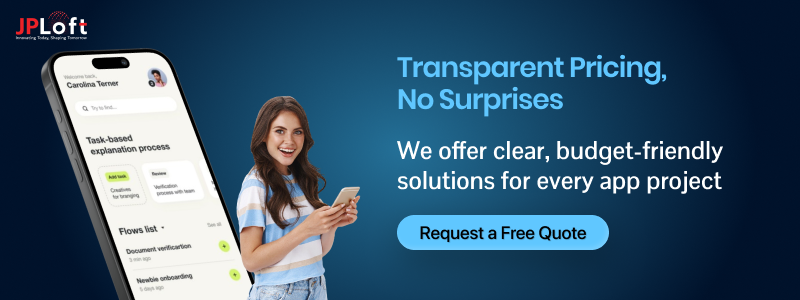
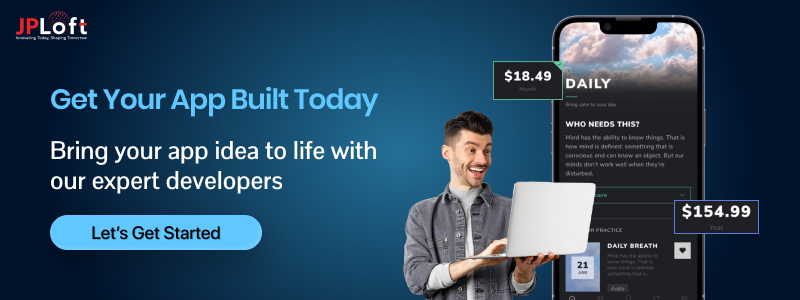
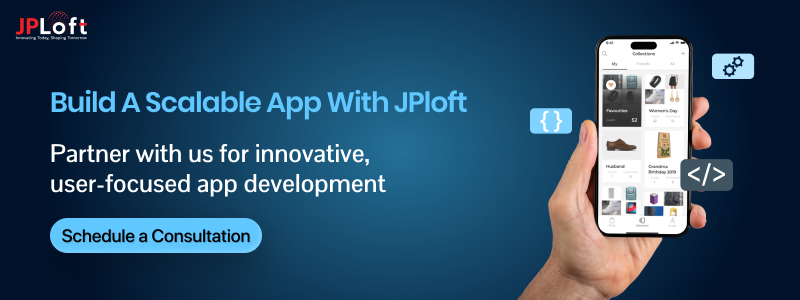


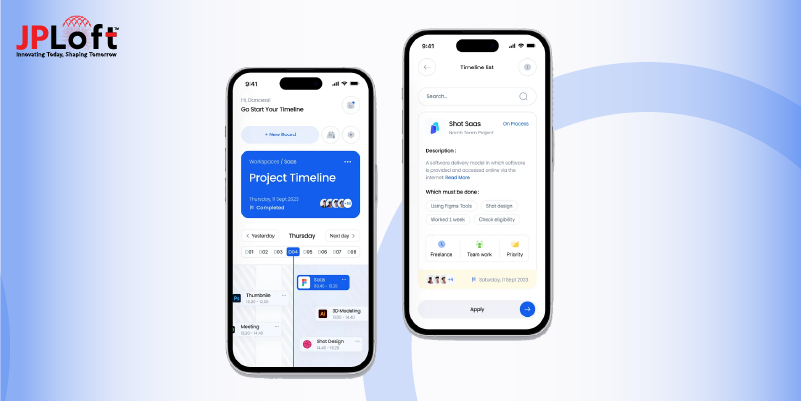
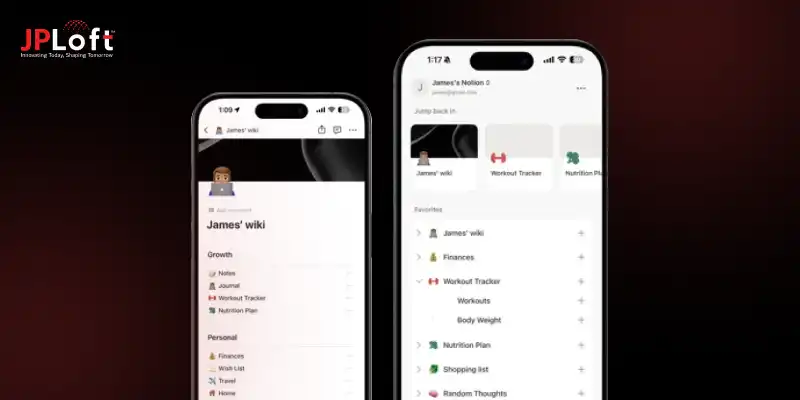


Share this blog